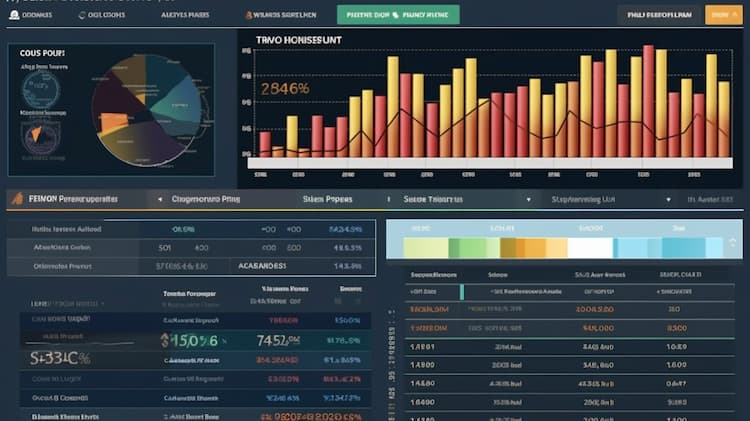
What is the RAVI ETF ?
Discovering DRN and RAVI ETFs: Unraveling the Potential of Two Prominent Investment Instruments. Learn about the DRN and RAVI ETFs, their unique features, and how they offer investors exposure to distinct market opportunities.
The issuer of the VPC ETF, Virtus ETF Advisers LLC, is committed to providing investors with exposure to a unique segment of the market. The VPC ETF focuses on investing not less than 80% of its assets in component securities of the Underlying Index, which tracks U.S.-listed, registered closed-end investment companies that have chosen to be regulated as business development companies (BDCs) under the Investment Company Act of 1940. In addition, the index includes U.S.-listed, non-BDC registered closed-end funds that provide significant exposure to private credit. Virtus ETF Advisers LLC follows a passive or indexing investment approach, aiming to replicate the Underlying Index's performance. With a concentration in the financial sector, this ETF offers a unique way for investors to access private credit strategies within the U.S. market.
The VPC Dividend ETF primarily focuses on investing in component securities of the Underlying Index, which tracks U.S.-listed, registered closed-end investment companies and non-BDC registered closed-end funds that provide substantial exposure to private credit. To be eligible for inclusion in the Underlying Index, securities must meet specific criteria, including having a market capitalization of over $100 million, a consistent dividend payment history over the previous three years, and trading activity requirements. The Underlying Index constituents are weighted by dividend yield, and the index is reconstituted annually and rebalanced quarterly. This ETF aims to replicate the performance of the Underlying Index and may provide investors with dividend income while focusing on private credit strategies.
VPC ETF is all about mirroring the performance of the Underlying Index, which is designed to monitor U.S.-listed, registered closed-end investment companies operating as business development companies (BDCs) under the Investment Company Act of 1940, along with U.S.-listed non-BDC registered closed-end funds that offer substantial exposure to private credit. These components must meet specific criteria, including market capitalization, liquidity, trading activity, and dividend consistency. To be included in the Underlying Index, securities must have private credit exposure, achieved through various strategies like senior secured loans, unsecured debt, mezzanine financing, and more. VPC Tracking aims to replicate the Underlying Index's performance, making it a suitable choice for investors looking for exposure to private credit-focused BDCs and closed-end funds. The Fund primarily adopts a passive indexing approach and seeks to closely correlate its performance with the Underlying Index, with a target correlation of 95% or better.
The correlation aspect of the Virtus Private Credit Strategy ETF (VPC) is vital in understanding its behavior within the realm of private credit strategies. VPC aims to track an index consisting of U.S.-listed, registered closed-end investment companies (BDCs) and non-BDC registered closed-end funds that offer significant exposure to private credit. Given its focus on private credit instruments such as floating loan interests, CLOs, and senior loans, VPC's correlation with the performance of these private credit assets is a critical factor for investors seeking to gauge its effectiveness in replicating private credit market trends. To explore and analyze VPC's correlations with various private credit instruments and other assets, investors can utilize the ETF Insider web app, which provides comprehensive data and visualization tools, helping investors make informed decisions and identify potential overlaps in their portfolios.
The Vanguard Private Credit ETF (VPC) primarily focuses on the private credit sector. Under normal market conditions, this ETF invests not less than 80% of its assets in component securities of the Underlying Index. The Underlying Index is designed to track the performance of U.S.-listed, registered closed-end investment companies that have elected to be regulated as business development companies (BDCs) under the Investment Company Act of 1940, as well as U.S.-listed, non-BDC registered closed-end funds that provide significant exposure to private credit. VPC offers investors an opportunity to gain exposure to private credit instruments, including floating or variable loan interests, collateralized loan obligations (CLOs), senior loans, and other private credit strategies. This concentration in the private credit sector can provide potential income and diversification benefits for investors seeking exposure beyond traditional fixed-income investments. However, it's important to note that private credit instruments often come with higher risk profiles compared to more traditional fixed-income securities.
The exposure characteristic of the Virtus Private Credit Strategy ETF (VPC) centers around providing investors with exposure to U.S.-listed, registered closed-end investment companies operating as business development companies (BDCs) and non-BDC registered closed-end funds that emphasize private credit. This ETF, in line with its index, seeks to capture the performance of these specialized investment vehicles, offering a unique avenue for investors to access private credit strategies in their portfolios. VPC''s exposure is designed to align with those seeking income and capital appreciation through investments in private credit instruments, such as floating or variable loan interests, collateralized loan obligations (CLOs), senior loans, and other similar vehicles.

ETF Insider is a data-driven portfolio analytics and optimization platform that introduces a more efficient and practical way to visualize, analyze and optimize portfolios.
Rather than focusing on the surface-level attributes of ETFs and Mutual Funds, ETF Insider goes deeper by examining the underlying holdings of exchange traded products.
By organizing and structuring that data, investors can easily navigate within their overlapping layers.
This innovative perspective combined with modern data visualization and modeling tools, provides an entirely new approach to portfolio optimization that can quickly expose both portfolio inefficiencies and opportunities.

Discovering DRN and RAVI ETFs: Unraveling the Potential of Two Prominent Investment Instruments. Learn about the DRN and RAVI ETFs, their unique features, and how they offer investors exposure to distinct market opportunities.

The VPC ETF is a specialized investment fund that focuses on global companies in the relevant sectors. This exchange-traded fund offers investors exposure to a diverse range of innovative and cutting-edge companies engaged in advancements in the industry. Discover the potential growth opportunities and risks associated with investing in this dynamic sector through the VPC ETF.

The RPHS ETF is a specialized investment fund that focuses on a specific sector. This exchange-traded fund offers investors exposure to a range of companies in this sector.
ETF Insider is a novel portfolio optimization tool that uses the power of data visualization to gain insight into portfolio compositions, concentration risks, portfolio efficiency and more. Complex financial data can be transformed into visually appealing and easily digestible graphs and charts, allowing investors to quickly identify trends and make well-informed investment decisions. Not only does this save time, but it also increases the accuracy and effectiveness of portfolio management.